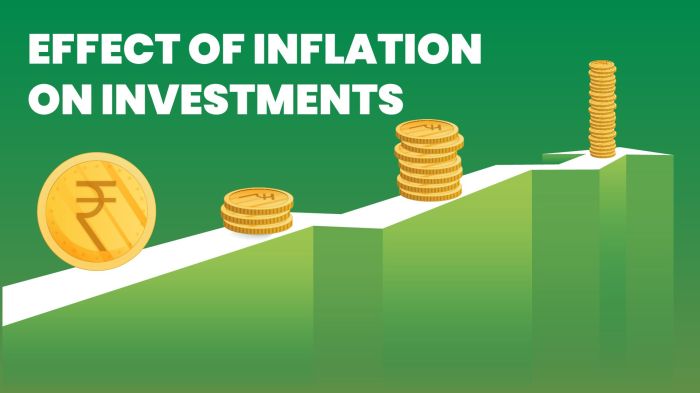The impact of inflation on investments unravels a complex relationship between economic factors and financial decisions, shedding light on strategies to navigate turbulent waters and ensure long-term stability. Delve into this insightful exploration to empower your investment choices and safeguard your wealth.
Inflation, a seemingly abstract concept, can have tangible consequences on your investment portfolio, influencing everything from stock market performance to retirement savings. By understanding how inflation operates in the financial landscape, you can proactively adapt your investment tactics to thrive in an ever-changing market environment.
Introduction to Inflation and Investments: The Impact Of Inflation On Investments

Inflation is the rate at which the general level of prices for goods and services is rising, leading to a decrease in purchasing power over time. This economic phenomenon has a significant impact on investments as it affects the real returns of various asset classes. Investors need to consider the effects of inflation when making investment decisions to preserve and grow their wealth.
Impact of Inflation on Investment Decisions
- Inflation erodes the purchasing power of cash: When prices rise due to inflation, the value of cash decreases. This means that holding onto cash can lead to a loss in real value over time.
- Effect on fixed-income securities: Fixed-income investments like bonds may see their returns diminished by inflation. The interest payments received may not keep pace with the rising cost of living, leading to reduced purchasing power.
- Impact on equities: Stocks can be a hedge against inflation as companies can potentially raise prices to keep up with rising costs. However, high inflation rates can also negatively impact consumer spending and corporate profits, affecting stock performance.
- Real estate and commodities: Real assets like real estate and commodities have historically been considered inflation hedges. These assets may see their values increase during inflationary periods, providing a potential buffer against the erosion of purchasing power.
Types of Investments Affected by Inflation
When it comes to investments, inflation can have varying impacts depending on the type of investment. Let’s delve into how inflation affects different investment vehicles.
Stocks
Stocks can be influenced by inflation in both positive and negative ways. Inflation can erode the purchasing power of a company’s earnings, leading to lower profits. However, during times of moderate inflation, companies may be able to raise prices to keep up with rising costs, which can boost revenues and stock prices. Additionally, in periods of high inflation, investors may turn to stocks as a hedge against inflation, driving up stock prices.
Bonds and Fixed-Income Securities
The impact of inflation on bonds and fixed-income securities is more straightforward. Inflation erodes the real value of fixed interest payments, leading to a decrease in purchasing power for bondholders. As a result, when inflation rises, bond prices tend to fall as investors demand higher yields to compensate for the loss in purchasing power. This can result in lower returns for bond investors.
Real Estate Investments
Real estate investments are also affected by inflation. Inflation can drive up construction costs, making it more expensive to build new properties. This can lead to an increase in property prices as the supply of new homes decreases. Additionally, in times of high inflation, real estate is often seen as a tangible asset that can retain its value, making it a popular investment choice for those looking to hedge against inflation.
Strategies to Counter Inflation Effects on Investments

Inflation can erode the purchasing power of investments over time, making it crucial for investors to employ strategies to counter its effects. Here are some effective ways to mitigate the impact of inflation on investments:
Hedging Strategies to Mitigate Inflation Risks
One way to protect investments against inflation is through hedging strategies. Investors can consider investing in assets that tend to perform well during inflationary periods, such as Treasury Inflation-Protected Securities (TIPS) or real estate. By diversifying their portfolio with these inflation-hedging assets, investors can offset the effects of rising prices on their overall investment returns.
Diversification as a Way to Protect Investments Against Inflation, The impact of inflation on investments
Diversification is another key strategy to counter the effects of inflation on investments. By spreading investments across different asset classes, sectors, and geographies, investors can reduce the risk of being heavily impacted by inflation in any one area. Diversifying a portfolio can help cushion the impact of inflation on overall returns and provide a level of protection against economic uncertainties.
Investing in Commodities as a Hedge Against Inflation
Investing in commodities can also serve as a hedge against inflation. Commodities such as gold, silver, oil, and agricultural products have historically provided a store of value during inflationary periods. By including commodities in their investment portfolio, investors can benefit from the potential price appreciation of these assets when inflation rises. However, it is essential to carefully consider the risks associated with commodity investments, such as volatility and market fluctuations.
Impact of Inflation on Retirement Investments
Inflation can have a significant impact on retirement investments, potentially eroding the purchasing power of savings over time. Retirees face the challenge of making their money last throughout their retirement years, and inflation can complicate this goal.
Importance of Adjusting Investment Strategies for Retirement in an Inflationary Environment
Retirees need to adapt their investment strategies to account for inflation in order to protect their savings. It is crucial to consider investments that offer growth potential to outpace inflation and preserve the value of retirement funds.
- Allocate a portion of your portfolio to assets that have historically provided a hedge against inflation, such as real estate or commodities.
- Consider investing in Treasury Inflation-Protected Securities (TIPS) that adjust for inflation to safeguard against purchasing power loss.
- Regularly review and rebalance your investment portfolio to ensure it aligns with your retirement goals and risk tolerance in an inflationary environment.
Tips for Retirees to Protect Their Investments from Inflation
Retirees can take proactive steps to mitigate the impact of inflation on their retirement investments and secure their financial future.
- Focus on a diversified investment portfolio that includes a mix of asset classes to spread risk and potentially offset inflation effects.
- Consider delaying Social Security benefits to maximize payouts and provide a reliable income stream that adjusts for inflation.
- Work with a financial advisor to create a comprehensive retirement plan that addresses inflation risks and incorporates strategies to protect savings over time.
In conclusion, the impact of inflation on investments underscores the importance of proactive financial planning and strategic decision-making. By staying informed, diversifying your portfolio, and employing effective hedging techniques, you can weather the storm of inflation and emerge stronger on the other side. Take control of your financial future and navigate the complexities of inflation with confidence and foresight.
Obtain direct knowledge about the efficiency of Stock market investment tips through case studies.


